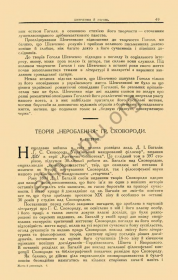H. Skovoroda's theory of ‘neroblennia’. In Life and Revolution, No 4, 1926, pp. 49-55.
Keywords:
Skovoroda studies, Ukrainian philosophy, practical philosophy, history of philosophy, philosophy of Ukrainian emigrationSynopsis
The article is a review by Viktor Petrov of Dmytro Bahalii's book ‘H. S. Skovoroda. Ukrainian Travelling Philosopher’ (1926), a thorough study that is the result of 30 years of Bahalii's research on Skovoroda. The subject of Petrov's analysis and polemical remarks is Skovoroda's theory of "neroblennia" [not doing] described in detail by Bahalii, which the researcher attributes to Skovoroda's folklorist worldview. Petrov, although he shares the thesis of Skovoroda's anti-utilitarian worldview, advocated by Bahalii and some other Skovoroda scholars (in particular, Pavlo Zhytetskyi), does not share Bahalii's view of Skovoroda as a narodnyk and ‘the predecessor of future khlopomans, because, according to Petrov, ‘the sources and ideological and social “ simplifications” of Skovoroda and the narodnyks were too different’ (p. 55). According to Petrov, the pessimism and tragedy of Skovoroda's consciousness and work is due to the discrepancy between the oppressive life context of Catherine's Russia (p. 51), in which Skovoroda was forced to live, and his personal worldview. Ultimately, according to Petrov, behind the humiliating role of a ‘simple and lowly person’ at the time, he ‘hid the consciousness of his superhumanity’ (p. 52), and the idea of ‘neroblennia’ and the highly abstract concept of ‘ideal life’ became the only possible form of Skovoroda's existence in the socio-political context of the time.
Vlada Davidenko
Downloads




